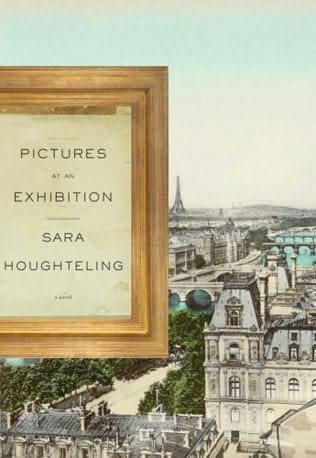 The humidity and heat were stifling last evening - it's like NYC is being sat on by some great, hairy animal. Reading seemed to be the only solution to my discomfort and so I finished Sara Houghteling's debut novel, Pictures at an Exhibition. Set in Paris just before and just after the Vichy occupation, it chronicles the singular story of Max, the son of a Jewish art dealer. Before the war, he is desperate to be good enough in his father's eyes to go into the family business. But Max's father encourages him to go to medical school and hires instead a remarkable young women, Rose, with an encyclopedic memory for paintings and with whom Max falls obsessively in love. Following the liberation of France, Max tries to track down both the paintings and this remarkable woman. The story is, in some ways, the story of the looting of museums and galleries and the fate of all the art considered "non-aryan" by the Nazis, but then it would be a history book. I was going to say "just" a history book, but that really isn't fair, history can encompass more than dry fact and at times be thrilling to read, but this book exceeds that genre not merely by being partly fictionalized but also because it tells a story of the heart. It is about the tragedy of loving beautiful things (and people). It is about growing to realize what is real and what forgery and that often what gives beautiful things value is not based simply on fact, nor on what is seen at the surface, but on what one believes about the thing or person. As Max and his father roam Paris looking for the paintings, Max quotes Goethe:
The humidity and heat were stifling last evening - it's like NYC is being sat on by some great, hairy animal. Reading seemed to be the only solution to my discomfort and so I finished Sara Houghteling's debut novel, Pictures at an Exhibition. Set in Paris just before and just after the Vichy occupation, it chronicles the singular story of Max, the son of a Jewish art dealer. Before the war, he is desperate to be good enough in his father's eyes to go into the family business. But Max's father encourages him to go to medical school and hires instead a remarkable young women, Rose, with an encyclopedic memory for paintings and with whom Max falls obsessively in love. Following the liberation of France, Max tries to track down both the paintings and this remarkable woman. The story is, in some ways, the story of the looting of museums and galleries and the fate of all the art considered "non-aryan" by the Nazis, but then it would be a history book. I was going to say "just" a history book, but that really isn't fair, history can encompass more than dry fact and at times be thrilling to read, but this book exceeds that genre not merely by being partly fictionalized but also because it tells a story of the heart. It is about the tragedy of loving beautiful things (and people). It is about growing to realize what is real and what forgery and that often what gives beautiful things value is not based simply on fact, nor on what is seen at the surface, but on what one believes about the thing or person. As Max and his father roam Paris looking for the paintings, Max quotes Goethe:"Let the observer look steadfastly on a small colored object and let it be taken away after a time while his eyes remain unmoved. The spectrum of another color will then be visible on the white plane. It arises from an image which now belongs to the eye."This is Goethe's description of a neurological phenomenon which occurs because of the way our visual system perceives color, but it is also a description of the experience of the survivors of the war. When a painting was taken away, when Max loses Rose, or when many millions of lives were obliterated by the Nazis in World War II, those who remained afterward perceived the world anew, as though an afterimage was burned onto the emptiness before them.
This is a first novel so naturally it offers the occasional self conscious moment, and I remained unconvinced by the excessively chaste and romanticized desire of young Max, but mostly I found Sara Houghteling's prose assured and the scope of her book most impressive. It encompasses history in a real setting and some real people, a love of art, a bildungsroman, some excellent and surprising plotting. Complex ideas about the loss of loved things and loved people, and what drives a sense of purpose in a moral life gives it its center.
Here is my other post about Pictures at an Exhibition.
















No comments:
Post a Comment